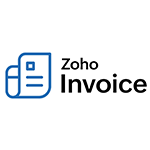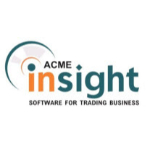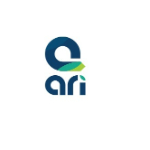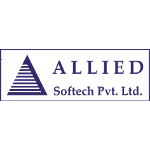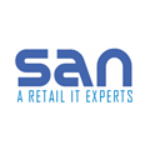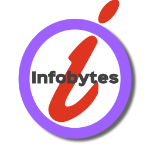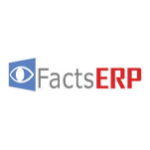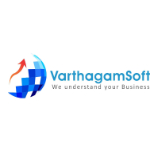List of Best Departmental Store Software
Showing 10 of 23 productsZoho Invoice is free invoicing software built for small business owners, freelancers, and entrepreneurs. Using this robust software, businesses can create and send invoices; collect online payments; manage quotes, recurring invoices, projects, and ex...Read Zoho Invoice Reviews
Acme Insight is a software designed to streamline and simplify business operations. With its powerful features and user-friendly interface, Acme Insight revolutionizes the way businesses manage their processes, saving time, effort, and resources. Sta...Read Acme Insight Reviews
Ari Retail POS is a versatile is a software solution designed to revolutionize the retail industry. With Ari, managing sales, inventory, and customer data has never been easier. Simplify your point-of-sale operations and elevate your business to new...Read Ari Retail POS Reviews
Finac Retail is a software for retail businesses. Streamline your operations, boost your sales, and stay ahead of the competition with Finac Retail. Simplify your day-to-day tasks and make informed decisions with its user-friendly interface. Say good...Read Finac Retail Reviews
San Restaurant Billing, a powerful is a software designed specifically for restaurant owners. Say goodbye to manual calculations and paperwork, and hello to streamlined processes and accurate billing. With San Restaurant Billing, managing your restau...Read San Restaurant Billing Reviews
CRM@MCIAPPS is a leading business solutions software from MCi Apps, designed to streamline customer relationship management for businesses. Our comprehensive platform is fully customizable and seamlessly integrates with all stages of a businesss valu...Read mciapps Reviews
s-Retailer is a software solution for modern retail businesses. Designed to streamline and simplify your operations, s-Retailer is the perfect tool to boost efficiency, drive sales, and enhance customer experience. Say goodbye to outdated methods and...Read s-Retailer Reviews
FactsERP is a one-of-a-kind software designed to streamline and simplify business management processes. With its innovative features and user-friendly interface, FactsERP offers a seamless experience to businesses of all sizes. By providing efficient...Read FactsERP Reviews
Twirll is a software that streamlines your social media management. With Twirll, say goodbye to the hassle of switching between multiple platforms and hello to a seamless is a experience. Get ready to elevate your social media game with Twirlls user-...Read Twirll Reviews
VarthagamSoft is a leading software company that specializes in developing innovative solutions for businesses and organizations. With a team of highly skilled professionals, VarthagamSoft aims to provide its clients with efficient and effective soft...Read VarthagamSoft Reviews
- What Is Departmental Store Software?
- Top Reasons Why Businesses Need Departmental Store Software?
- What Are the Top Key Features of Departmental Store Software?
- What Are the Top Benefits of Departmental Store Software?
- What Are the Steps to Choose the Right Departmental Store Software?
- What Are the Types of Departmental Store Software for Different Industries?
- What Are the Technology Trends for Best Departmental Store Software?
- What Are the Deployment Options for Departmental Store Software?
What Is Departmental Store Software?
A departmental store software refers to a computer application specifically developed to facilitate the management and operations of a departmental store.
The aforementioned is a retail management system that effectively manages many daily operations, including but not limited to stock and sales tracking, customer loyalty programs, promotional sales, staff scheduling, and other related tasks.
Merchants are able to utilize this technology to effectively monitor and analyze sales data, assess client demand, efficiently allocate staff responsibilities, automate inventory management, and perform additional functions.
Moreover, best software for departmental store serves to streamline administrative functions like as financial planning, financial reporting, taxation, employee compensation, and the management of payroll-related taxes. Additionally, it provides real-time statistics, enabling firms to monitor client purchases and identify potential avenues for enhancing return on investment (ROI).
This technology has the potential to optimize several operational procedures within a corporation, encompassing tasks such as customer retention and management, as well as shipping and inventory control.
By implementing automation for operations that are repetitive and consume a significant amount of time, organizations may allocate their staff's time more effectively towards tasks of higher importance, such as extending their client base, enhancing customer satisfaction, promoting products, and driving revenue growth.
Top Reasons Why Businesses Need Departmental Store Software?
1. Increased efficiency and productivity: The utilization of departmental store software enables organizations to streamline several routine and repetitive activities, including but not limited to inventory management, order fulfillment, and data evaluation. This enhancement leads to a general improvement in efficiency and production.
2. Enhanced customer experience: Utilizing the best departmental store software facilitates businesses in establishing a cohesive shopping experience by offering clients an intuitive and streamlined navigation system.
3. Improved inventory management: The utilization of the best software for departmental store software enables firms to monitor inventory levels in real time and initiate automatic reordering of products when inventory levels reach a low threshold. This practice aids in guaranteeing that clients consistently can locate the items or services they require.
4. Accurate forecasting: The software utilized in departmental stores can forecast sales by analyzing historical data. This facilitates organizations in making more informed judgments regarding their future inventory acquisitions.
5. Streamlined checkout and payment processing: The use of top departmental store software offers customers an expedited and enhanced checkout experience, characterized by increased efficiency and heightened security measures. This enhances customer happiness and diminishes the duration clients need to complete a purchase.
6. Improved customer loyalty: The utilization of departmental store software enables firms to establish loyalty programs that incentivize clients for their recurring purchases. This phenomenon contributes to the establishment of client loyalty and enhances the probability of subsequent purchases.
7. Streamlined reporting: The utilization of departmental store software streamlines the generation of reports encompassing several aspects, including daily sales, consumer demographics, and average ticket sizes. This facilitates enterprises in making more precise and informed judgments.
8. Fallback systems: The utilization of departmental store software offers firms a contingency solution that enables data recovery in the event of an unforeseen circumstance.
9. Inventory optimization: The utilization of the best departmental store software facilitates the optimization of inventory management for businesses by effectively reducing surplus stock and ensuring the appropriate level of stock availability.
10. Fraud prevention: The utilization of departmental store software enables firms to detect instances of fraudulent conduct through the examination of client data and the identification of questionable orders.
11. Improved customer service: The implementation of top departmental store software enables customers to promptly submit feedback, facilitating businesses in promptly addressing customer issues and enhancing the overall customer experience.
12. Automated marketing campaigns: The utilization of departmental store software enables businesses to establish automated campaigns that are activated in response to client data, including but not limited to purchase history, geographical location, and demographic information.
13. Accessible data: The utilization of the best software for departmental stores facilitates convenient and unrestricted access to data, regardless of time or location. This facilitates prompt and efficient decision-making for enterprises.
14. Cost savings: The use of top departmental store software has the potential to mitigate expenses related to labor-intensive tasks, such as the recruitment and employment of supplementary personnel.
15. Scalability: The software utilized by departmental stores possesses the capacity to adapt and evolve alongside organizations, enabling them to achieve growth and expansion while maintaining optimal operational effectiveness.
What Are the Top Key Features of Departmental Store Software?
The top key features of departmental store software are:
1. Stock management: The use of a Decision Support System (DSS) facilitates the effective management of inventory and stock levels, enabling shop managers to promptly identify instances where stock levels are depleting.
2. Point of Sale (POS): This functionality enables shops to engage in the sale of products, facilitate payment transactions, and oversee customer account management inside a unified platform.
3. Data Security: Security protocols are implemented to safeguard sensitive data and financial activities, thereby guaranteeing the security of client information and the assets of the establishment.
4. Reports and Analytics: The analysis of crucial data enables store managers to acquire valuable information regarding the business's success, encompassing aspects such as consumer preferences, trends, and the identification of best-selling products.
5. Automated Processing: This functionality enables the processing of large-scale orders, streamlined checkouts, email notifications, and automated payment processing.
6. Customer Relationship Management (CRM): A CRM system facilitates the execution of focused marketing initiatives by store managers, enabling them to effectively engage with both current clientele and potential prospects.
7. Payment Gateway Integration: The incorporation of specialized payment gateways facilitates the acceptance of diverse payment methods, such as credit and debit cards, by merchants.
8. Inventory Management: Decision Support Systems (DSS) facilitate the monitoring and management of product information such as barcodes, prices, discounts, and other relevant facts. This capability becomes beneficial to store owners as it enables them to maintain precise and up-to-date records.
9. Mobile Access: Mobile applications enable store owners to conveniently access essential functions, even while they are physically distant from their store.
10. Product Suggestions: The logical rules of the system facilitate the provision of product recommendations to customers by store owners, taking into account their previous preferences.
What Are the Top Benefits of Departmental Store Software?
1. Improved Efficiency: The implementation of departmental store software streamlines operations, resulting in enhanced efficiency and the eradication of manual errors.
2. Real-time Inventory Management: The utilization of modern inventory management software in departmental stores enables retailers to effectively monitor their inventory levels and promptly restock items.
3. Enhanced Customer Service: The utilization of the best departmental store software enables store employees to efficiently conduct product searches, provide immediate recommendations, and expedite sales and refund transactions with precision and accuracy.
4. Improved Record-Keeping & Reporting: The utilization of departmental software facilitates the generation of comprehensive reports that enable organizations to do comparative analyses of sales over various timeframes, ascertain the most popular items, and formulate effective marketing plans.
5. Increased Visibility & Security: The utilization of top departmental store software facilitates the establishment of a centralized data system, hence enabling businesses to effectively monitor and manage information across several locations. Additionally, this software ensures the maintenance of a safe and traceable transaction history.
6. Automation of Store Management: The utilization of the best software for departmental stores enables merchants to streamline their daily operations, encompassing activities such as inventory management, invoice generation, sales transactions, and customer support.
7. Optimization for Special Events: The utilization of departmental store software allows retailers to effectively optimize their operations in anticipation of special events, like back-to-school sales, holiday promotions, and seasonal fluctuations.
8. Enhanced Data Analysis: The utilization of the best departmental store software offers retailers comprehensive data analytics, facilitating the identification of patterns and enabling the prediction of client behaviors.
What Are the Steps to Choose the Right Departmental Store Software?
1. Assess Your Current Needs: The primary phase in the selection process of appropriate departmental store software is evaluating one's existing requirements. This entails comprehending the number of departments within an organization and the exact functions and characteristics required for each department.
2. Research Options: Once the necessary features and functions have been identified, it is advisable to conduct thorough research on the various software solutions available for departmental stores. To enhance one's comprehension of the various software alternatives, it is advisable to engage in the examination of web evaluations and consult with domain specialists.
3. Compare Features: To identify the most suitable departmental store software for your requirements, it is important to do a comparative analysis of the many features and functions offered by different solutions available in the market. One should search for attributes such as customer management, inventory support, finance management, and other relevant aspects.
4. Assess Price: The cost of top departmental store software can vary significantly, ranging from a few hundred dollars to several thousand dollars. It is imperative to factor in the cost element while making a decision.
5. Test Out the Software: Before reaching a conclusive conclusion, it is advisable to do a thorough evaluation of the program to ascertain its suitability in meeting your specific requirements. Numerous corporations provide complimentary trial periods for their departmental store software, allowing prospective users to experiment with its functionalities.
6. Make a Purchase: After completing the necessary research and conducting thorough testing, it is advisable to proceed with the purchase and implementation of the newly acquired top departmental store software.
What Are the Types of Departmental Store Software for Different Industries?
Various forms of departmental store software cater to diverse industries, encompassing retail management systems, warehousing management systems, inventory management systems, point-of-sale systems, and enterprise resource planning (ERP) systems.
1. Retail management systems offer store owners a wide range of tools to effectively oversee and enhance their operations. These tools encompass several functionalities like the management of product and customer data, financial management, analytics, and reporting.
2. Warehousing management systems include a range of technologies that enable the monitoring of inventory, the administration of warehouse operations, and the enhancement of material flow efficiency.
3. Inventory management systems assist store owners in monitoring and controlling the present inventory levels, as well as facilitating the process of replenishing products.
4. Point-of-sale (POS) systems facilitate efficient processing of consumer transactions by cashiers, while also offering additional functionalities such as loyalty and rewards programs.
5. Enterprise resource planning (ERP) solutions effectively amalgamate several facets of a store's operations, encompassing finance, human resources, sales, and marketing. Enterprise
6. Resource Planning (ERP) systems offer store proprietors a comprehensive perspective of their business activities and information, enabling them to discern inefficiencies and implement remedial measures.
What Are the Technology Trends for Best Departmental Store Software?
The technology trends for the best departmental store software include:
1. Cloud Computing: The utilization of cloud computing has witnessed a notable surge in popularity due to its ability to offer a cost-efficient means for departmental shops to acquire software and computing resources.
2. Automation: Automation has the potential to optimize workflows and minimize the need for manual labor. Automation can additionally contribute to the enhancement of precision and the optimization of client service.
3. Big Data: The utilization of big data enables departmental shops to get valuable insights into customer behavior and preferences, thus enhancing their ability to effectively focus marketing initiatives and ultimately drive sales growth.
4. Mobile Development: The implementation of mobile-friendly software might enable departmental stores to effectively adapt to the evolving preferences of customers, who are progressively utilizing smartphones or tablets as their primary means of accessing the internet.
5. Artificial Intelligence and Machine Learning: These technologies have the potential to be utilized in the domains of software development and customer service, in addition to facilitating the generation of predictions and recommendations by leveraging consumer data.
6. Internet of Things (IoT): Internet of Things (IoT) devices have the potential to facilitate real-time inventory management and enhance the customer experience within departmental stores.
.
What Are the Deployment Options for Departmental Store Software?
When implementing software for departmental stores, various alternatives are available, contingent upon the particular requirements and available resources of the organization.
Common deployment options include:
1. On-Premise: This alternative entails the local installation of software within the departmental store. The implementation of this technology offers enhanced system security and increased levels of control over configurations and data.
2. Cloud-Based: This alternative entails the implementation of software within a cloud-based infrastructure. Cloud-based solutions require less maintenance and have the potential to yield cost savings in comparison to on-premise systems.
3. Hybrid Model: This alternative offers a hybrid approach by integrating on-premise and cloud-based systems, enabling enterprises to retain sensitive data on-premise while leveraging the benefits of cloud-based solutions.
4. Multi-Location: This particular solution is most suitable for departmental shops of considerable size, encompassing numerous locations, as it facilitates the consolidation of data and enhances operational effectiveness.
Furthermore, several software packages offer additional deployment alternatives that are specifically designed to cater to the unique requirements of departmental stores, like mobile deployment and virtualization.
